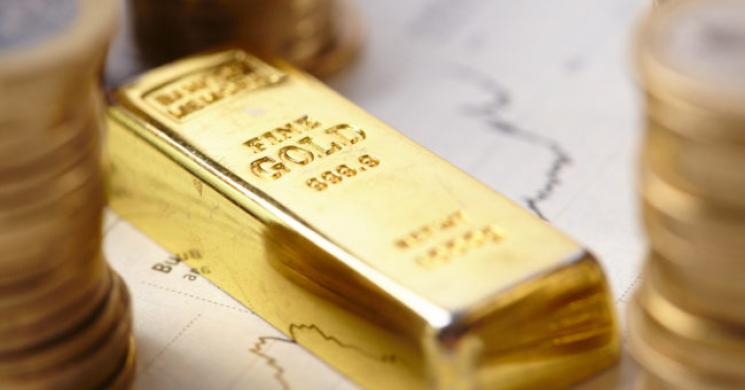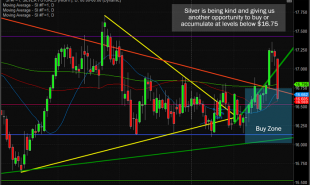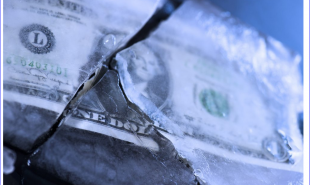
A push for more sanctions on North Korea, PBOC lays the smackdown on ICOs, and the RBA kicks off a busy month for central bankers. Here are some of the things people in markets are talking about.
Dollar Dump
Interest in Gold is showing signs of broadening after last night's open with no signs of an easy escape from the escalating rhetoric and actions of
the Trump administration in response to North Korea's H-Bomb test.
According to Moor Analytics: One area of possible exhaustion for this move up comes in at 13466-556. The decent trade back above 13278 (+1 tic per/hour) put the macro bull calls back into play.
Gold now:
live trading HERE
Parts via Reuters
The U.S. currency against a basket of other major currencies recently fell towards 90, to its lowest since January 2015, largely due to speculation the Federal Reserve is unlikely to raise interest rates as quickly as anticipated. [FED/R]
That made dollar-denominated gold cheaper for holders of other currencies; a relationship used by funds to generate buy and sell signals from mathematical models. [FRX/]
Spot gold XAU= hit $1,339.47 on Monday, its highest since Sept. 27 last year, a time when the metal was benefiting from a surge of interest following Britain’s vote to leave the European Union.
Investor interest can be seen in the holdings of physically-backed exchange traded funds, which at 54.757 million ounces are up more than three percent since Aug. 8.
‘Begging for War’
North Korea is “begging for war” by testing a nuclear weapon, said U.S. ambassador to the U.N. Nikki Haley on Monday in a push for harsher sanctions against Kim Jong Un’s regime. In a telephone call, U.S. President Donald Trump and South Korean President Moon Jae-in “agreed to maximize pressure” on North Korea. Moon’s government acceded to a temporary full deployment of a missile defense system and warned that its neighbors’ actions will damage financial markets as well as the real economy. Shutting down China’s oil exports to the unruly agitator next door are in focus as a way to bring North Korea to heel, though Beijing is unlikely to agree to take such a dramatic step. South Korea’s Chang Kyung-soo, acting chief of the Defense Ministry’s policy planning office, said on Monday that his country’s northern neighbor is preparing for a possible intercontinental ballistic missile launch.
Once Bitten
Cryptocurrencies were slammed on Monday after the People’s Bank of China outlawed initial coin offerings, with bitcoin falling as low as $4,164.80 – 15 percent below Friday’s close. The manifold restrictions on ICOs imposed by China could affect over 100,000 domestic speculators. All this is bad news for former reality TV star and heiress Paris Hilton, who tweeted that she was “looking forward to participating” in an initial coin offering by LydianCoin Pte Ltd. just hours before China’s declaration. Mark Mobius, executive chairman at Templeton Emerging Markets Group, warned that this is only the beginning of government crackdowns on cryptocurrencies.
one has to wonder how rtptos did not rally if they are heavily used as transfer mediums for money crossing borders. Perhaps we are beginning to see complacent longs in cryptos moving to preserve wealth by rolling profits into gold. They certainly weren't swapping BTC for USD last night.
Coming Up…
The first major central bank decision in a jam-packed month of monetary announcements comes courtesy of the Reserve Bank of Australia. Officials are expected to leave rates unchanged at record lows amid slumping consumer confidence and a buoyant currency; statement is due at 1:30 p.m. Tokyo time. Earlier in the day, a pair of service-sector surveys out of Australia and second-quarter current account data are also slated to be published. Another key event on the economic calendar is the 10:45 a.m. Tokyo time release of the Caixin China services purchasing managers’ index for August, after both manufacturing gauges unexpectedly strengthened on the month. Elsewhere, second-quarter construction work in New Zealand is forecast to rebound 1.6 percent quarter-on-quarter after a decline of 3.5 percent in the first three months of the year. Both headline and core inflation in the Philippines are forecast to quicken in August to annual paces of 3 and 2.2 percent, respectively. Also on deck: South Korea’s current account balance for July as well as Japan and India’s services PMIs for August.
Safety Sought
The Swiss franc and Japanese yen were the two best-performing currencies on Monday while the Bloomberg Dollar Spot Index dipped for the third straight session following North Korea’s latest act of aggression. One week implied volatility on the franc eclipsed that of the yenas investors seek a hedge that isn’t in Kim Jong Un’s line of fire. Gold also gained, rising to a fresh 11-month high. S&P 500 Index futures and the Stoxx Europe 600 Index traded to the downside; U.S. markets were closed on Monday for Labor Day. Gasoline fell to a one-week lowas U.S. refiners prepared to resume operations.
Futures Up
S&P/ASX 200 and Nikkei 225 futures are pointing to a rebound for Asian equities, which opened the week with widespread losses across regional benchmarks. Mainland Chinese stocks were a rare pocket of strengthin the area. Though the Kospi Index fell more than 1 percent on Monday, at least one strategist is advising domestic investors to take advantage of the buying opportunity.
Read more by Soren K.Group







